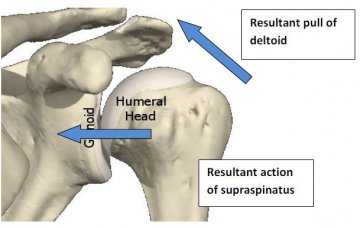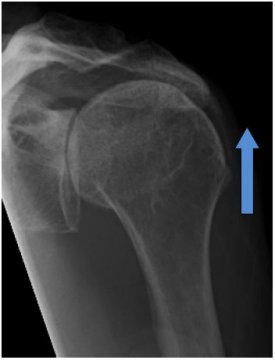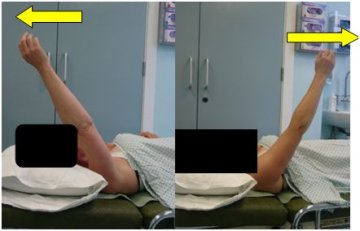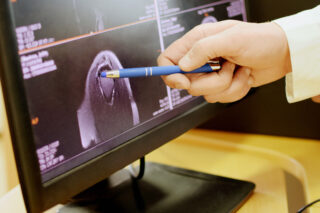Rotator cuff tear arthropathy
One of the roles of the rotator cuff and particularly the supraspinatus is to compress the glenohumeral joint. This aids the resultant force of the deltoid in smooth elevation of the arm.

When there is a dysfunction in the rotator cuff this can result in altered biomechanics in the shoulder. The humeral head is no longer centred on the glenoid. The resultant force of the deltoid contraction leads superior humeral head translation as the arm is elevated.
Rotator cuff disease is the most common cause of shoulder pain. Cuff tear arthropathy is considered to be endstage of rotator cuff disease.
Rotator cuff problems give typical pain and diffuculties with elevation of the arm.A secondary arthritis can occur in patients with massive rotator cuff tears this can occur about 20% of cases. This is usually painful and patients can have limited elevation of the arm, producing a ‘pseudoparalysis of the arm’ .
X Ray shows typical effect in cuff tear arthopathy with upward migration of the humeral head.

Instead of rotating and elevating, the humeral head slides up when elevation is attempted. Xrays reveal a typical pattern of superior migration of the humeral head. Attempts at repair of the rotator cuff does not work when this superior migration is present.
In recent years new rehabilitation techniques for treatment of massive and irreparable rotator cuff tears have been developed. Thisis referred to as an Anterior Deltoid Strengthening programme. To view programme click here.

The programme acts to strengthen the anterior deltoid to substitute for the torn rotator cuff. This aims to retrain the anterior deltoid to substitute for the rotator cuff. This needs at least 3 months to see if it works.
If this does not work then surgery can be considered. If the patient has relatively good elevation then an arthroscopic debridement is an option with reasonable pain relief.
Where we have pain and pseudoparalysis, shoulder replacement is an option. Results of standard shoulder replacement are poor. Reverse total shoulder arthroplasty was introduced in the 1990’s. It works by changing the mechanics of the shoulder to enhance the elevation power of the deltoid. In the majority of patients there is restoration of functional elevation and good pain relief.
The results of reverse total shoulder replacement are now equivalent to anatomical shoulder replacement. Reverse total shoulder replacement is now the most common shoulder replacement performed in the UK.
Andrew Brooksbank

CONSULTING HOURS
CONTACT DETAILS
CONDITIONS
Treatment journey
APPOINTMENTS
Make a consultantion appointment wiith Mr Andrew Brooksbank at BMI Ross Hall Glasgow.
FAQ’s
Frequently asked questions about appointments, treatment, recovery and insurance/payments.

